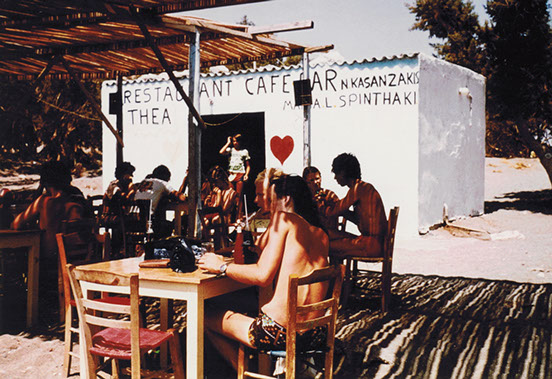
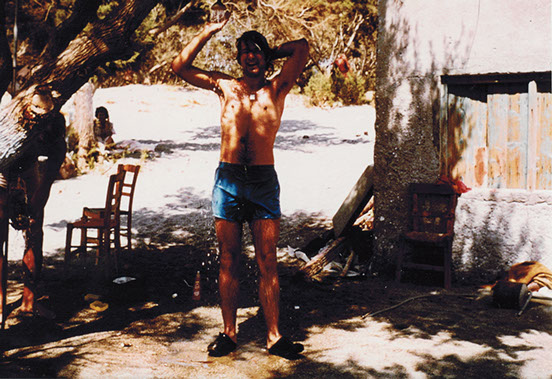
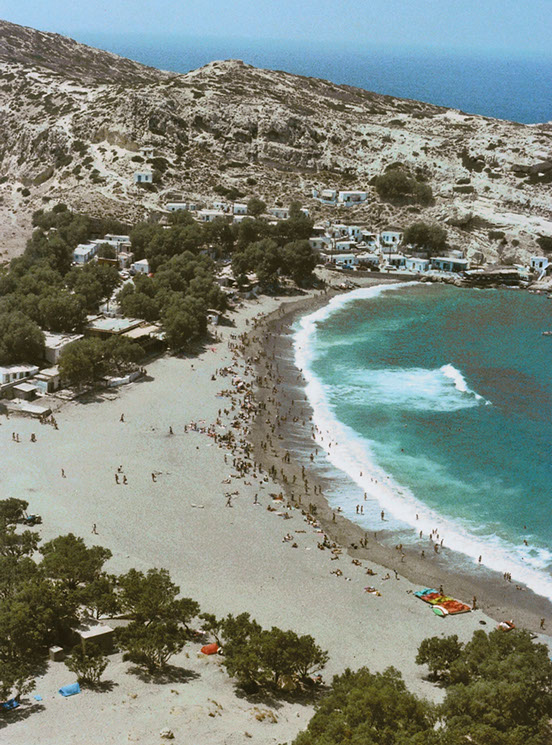
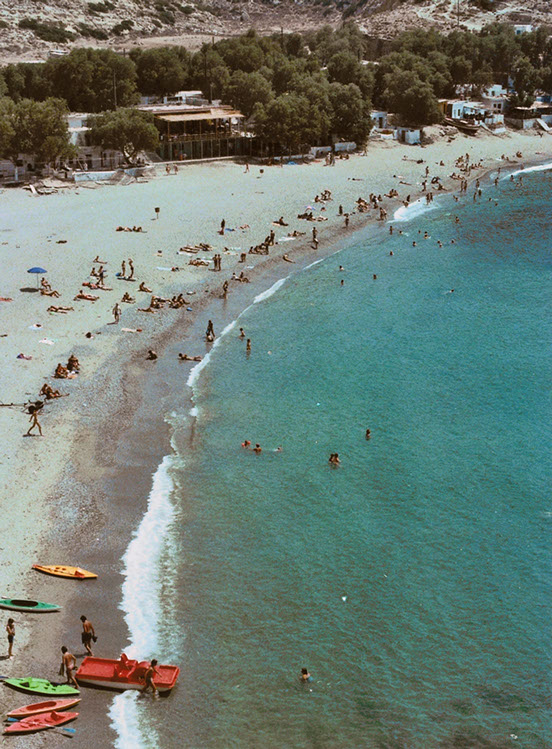
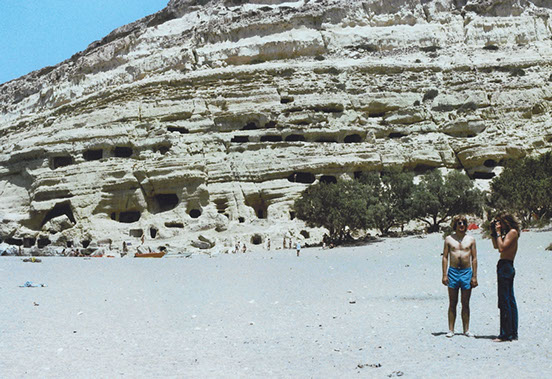
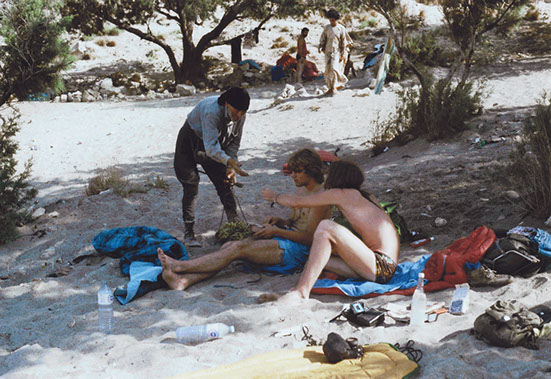
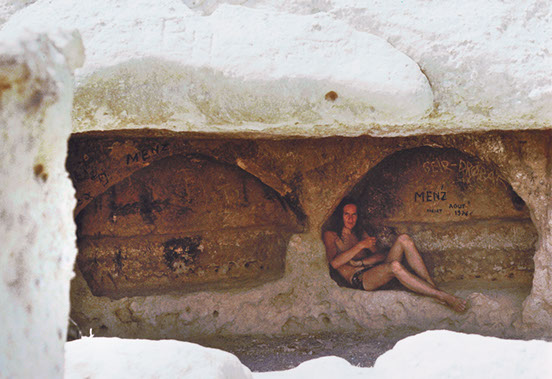
Kim, August 2012
Under the Matala Moon in the Age of Aquarius
Travelling to Matala was Howard’s idea, the fellow hippie from Newcastle that we had met during the previous year’s Inter-Rail. From some unidentified source he had picked up that Matala was a fabulous place for hippies. While we (my girlfriend Wenche, and Geir and Robert, friends since elementary school) had the one month Inter-Rail of total freedom before going back to toiling at school, Howard was a more professional hippie, - en route to the allegedly magical land, India. We met up with him as arranged in Athens. Before that we had come all the way from Norway by train, traversing all of Europe. That fact alone made the sense of pilgrimage strong and the expectations of Matala high already: the harder you have to try to achieve something, the more you will value it. Remember how the objects you acquired while young and poor outshine the things you purchase now, even if they are ‘objectively’ much higher quality. From Athens it was the overnight ferry from Pireus, then the bus from Heraklion to Matala.
Finally there; getting off the bus in the square, immediately catching a glimpse of the beach and the sea. The place instantly struck me as sympathetic and welcoming. A quick look at the other people confirmed that we were in the right place. The mandatory hippie uniform (we hated the military ones) surely meant a lot in those days: the stone-washed Levi’s, the loose fitting clothing, the long hair and beard, the self-assured aura mixed with a laidback friendliness. For girls colourful clothing without too much restriction. They may regard their breasts in some situations as somewhat unpractical features, but for a boy of nineteen they are pure poetry. Leonard Cohen said something about women being the poets of the world, didn’t he? Their long skirts lent an old-fashioned dignity, while long hair framed faces with softness and sensuality. The female body was embedded in a surrounding symphony of both nature and spirit, sex and poetry. The whole exciting multi-faceted gift of life was upon us: an instant bio-psycho-social-spiritual package!
Another aspect of hippie culture was the adoration of rock-music and the supposedly illumination effects of it. In his masterful description of fin-de-siecle Vienna The world of yesterday (1943) Stephan Zweig described the vital importance of the theatre in that period and the way the actors were worshipped. The adulation and the hero-worship they received was comparable to the rock stars of the sixties and seventies who were cast in the role of prophets, and rock music seen as some sort of revelation, the aesthetics of a new age. Looking back that seems a little like misplaced faith and premature hagiography, but then it was real, no doubt about it. We knew that Joni Mitchell had camped out at the beach in Matala, and that fact alone established a connection between Matala and rock music, and conveyed what we thought of as a democratic egalitarization between ‘us’ and the stars as well.
Getting to Matala was not only reaching a place of natural beauty, but also reaching a mythical place. Having just finished the mandatory introductory course in philosophy, logic and psychology at the University of Oslo, the presence of the caves lent a Platonic aura to the place. The caves also added a fascinating primeval element. Caves are the first human dwellings, the ur-house. In addition, these particular caves had been used as burial grounds since the times of Zeus himself. Incredible what cosmic powers and historical past one could connect with here! It was not possible to inhabit the caves in 1976-1977, but it was possible to stay there during the day. We made our camp right on the beach, behind the thin shelter of some small trees only 50 meters or so from the water, enabling us to hear the rhythmic splashing of the sea, and the sound of the retreating pebbles -
a constant accompaniment to our leisurely activities. We were surrounded by nature, which reminded us of the pantheistic vision Bob Dylan describes in the song Lay down your weary tune (1963):
Lay down your weary tune, lay down
Lay down the song you strum
And rest yourself ’neath the strength of strings
No voice can hope to hum
Struck by the sounds before the sun
I knew the night had gone
The morning breeze like a bugle blew
Against the drums of dawn
The ocean wild like an organ played
The seaweed’s wove its strands
The crashin’ waves like cymbals clashed
Against the rocks and sand
I stood unwound beneath the skies
And clouds unbound by laws
The cryin’ rain like a trumpet sang
And asked for no applause
The last of leaves fell from the trees
And clung to a new love’s breast
The branches bare like a banjo played
To the winds that listened best
I gazed down in the river’s mirror
And watched its winding strum
The water smooth ran like a hymn
And like a harp did hum
Lay down your weary tune, lay down
Lay down the song you strum
And rest yourself ’neath the strength of strings
No voice van hope to hum
We also felt a ‘oneness’ and kinship with the other dwellers - we were part of a spiritual movement who would soon ‘conquer the world’ (note the militaristic slant of the metaphor) and make our lives so much happier than the middle-class, suburban, square parents we had grown up with, embedded in their routine and insignificant preoccupations. We were something else; the genuine ones, the honest ones, the real ones who were going to improve the world to progress beyond the abysmal stalemate it had reached. The cross-cultural communication with Howard the Englishman added to the universalistic aura of what we were engaged in. Wenche’s father was a policeman; that was a profession we thought would be obsolete in the new and incoming era, when humanity connected to its hidden source of love in a society without fighting. Personally I liked Wenche’s father a lot, but unfortunately for him the forthcoming era of universal love would render his profession obsolete. How naïve was that thought!
Now, I am all for more police and much stricter jail-terms for criminal offenders, and I think the Norwegian state much too lenient on criminals and much too hard on us hardworking taxpayers! Our intoxication with nature and the friendliness of everyone we met were so in contrast to the drunken fights in my small town at closing time (which was then 00.30) on Saturday nights. We really thought of ourselves as ‘set apart’ from the mainstream in a positive way, bound to convert them to our way of life sooner or later. Time was on our side!
What did we do? Not very much. Being. Socializing, sex, intoxication, nature. Visual images that stands out in my memory are the Café at all times of day and the atmosphere and the music there, the outdoor shower mounted from a branch in a tree close to the Café, the donkey coming in with supplies from a neighbouring village in the morning, and the old man selling fresh figs on the beach. I also remember there was talk of police raids. Mainly for drugs, but also for propriety, as the police squad went around the beach and commanded the girls to put their tops back on. Archetypical squares and party-poopers! One single hour I remember vividly was renting a kayak on the beach. A storm was coming in and the kayak people were doubtful that it was safe to rent them out. Safe or not, they did, and we had the time of our lives, laughing continuously as the waves jolted the kayaks around in a turbulent unio mystica with nature. Because the waves were often quite tremendous the ordinary bathing experience seemed like a combination of California surfing and the advertisement for Old Spice aftershave. You could see a wall of water rising before and over you, and then you were swallowed up by the wave and chaotically tumbled around only to reach your orientation and stability just before the next wall of water came, in an endless circle of pure fun. That roller-coaster bathing experience was about the only activity, the rest was nature, relations and discussion with other people, and leisure.
We radiated pure happiness, accompanied by the incessant splash of the waves that reminded us of our place in nature and in the pantheistic scheme of things. While reading Czeslaw Milosz’ book ‘Proud to be a mammal’. Essays on war, faith and memory recently, I came across the following passage where the author describes his childhood. It stuck me as a perfect description of our Matala days:
‘I lived without yesterday or tomorrow, in the eternal present. This is,
precisely, the definition of happiness. I ask myself whether I now mythologize that period of my life. We all build myths when speaking of the past, for a faithful reconstruction of fleeting moments is impossible. The question, however, remains: Why do some people speak of their childhoods as happy, others, as miserable? The extreme vividness and intensity of my experience forces me to believe in its authenticity. It was, I do not hesitate to say, an experience of enchantment with the earth as Paradise’ (p. 80).
It is strange how our interpretation of seemingly trivial everyday incidents were coloured by our hippie sensitivities, our interpretative systems was liable to get into overdrive, triggered by small incidents. One example was the value connected with doing things slowly, contemplatively, thoughtfully and with mental presence. So if the bus was late or the service slow, this was not something to deplore. Au contraire, it only showed the superiority of the more leisurely and laid-back culture of the Mediterranean over Northern Europeian Puritanism. I remember particularly one incident; when the notoriously slow and ramshackle bus was on its way from Matala to Heraklion after our 1976 visit. When seeing some fruit trees close to the road in the middle of nowhere, the bus driver stopped and picked some fruit and ate it slowly and contemplatively. Then some locals came to chat with him. After quite some time he drove on. In our minds this only proved the spiritual qualities of the bus driver as a sophisticated philosophical rebel against inhuman and ‘square’ efficiency. We contrasted his elevated spirituality with the bus drivers at home, who did not do anything faintly like this, but focused on keeping the time. Useless squares! The incident with the fruit picking bus driver would surely have annoyed the hell out of me today, and it shows how different our mind-set were. It also shows how much the overall experience is created by the preconceptions and bias in our own psyche; what was a positive example of refinement thén would be a negative example of sloppiness nów.
And the music! I particularly remember Pink Floyd’s Dark side of the moon (1973) played over the speakers at the Café. The speakers were mounted in the neighbouring trees and the reproduction was light-years away from what is attained by high-end stereos today. But the experience! Without doubt the best way I have heard the album, aided by nature and context. Dark side of the moon fitted so perfectly in the Matala context, with its dreamy soundscapes and philosophical lyrics. Listening to Dark side of the moon in Matala at sunset time is one of the aesthetical peak experiences of my life. Reminiscing about it still brings shivers down my spine. The overall communal feeling, the sound of the waves intermingling with the music, the colouring of the sky; everything came together in a experience of multisensory synergy. We were so intoxicated with life, a life that in our youthful perspective stretched itself before us as a Pandora’s box of opportunities - long and ripe with hope.
Several years later, in the mid 1980’s, while training to become a psychologist, I was participating in a university course learning hypnosis. I was placed under hypnosis and as part of the instructions to attain a deeper level of hypnosis was asked to recall a pleasant experience of my life that united pleasure with harmony, and try to put myself back into it with all my senses. The experience that emerged was walking barefoot along the water’s edge in Matala at sunset in the direction of the caves, with Dark side of the moon playing in the background and my footprints being instantly washed away by the gently undulating water. So when I say that the experience of Matala is one of the most cherished experiences in my life I have scientific evidence to prove it!
I went back the summer after, in 1977, sans Howard who had gone to India and was never heard from again, except for one letter, and in the company of Geir and Torbjørn. Wenche and I were no longer together. This time my travelling companions and I had extended our circle of operations and stopped by Matala en route to new adventures in Egypt.
My Matala memories lay dormant in my soul, overlaid by layers of knowledge and seven years of university studies. From time to time I ran into people who had been there, and got some impressions of how things were developing there. Finally, thirteen years after my last visit, in the summer of 1990 my brother Dag and I travelled on Inter-Rail with Matala as a destination. As expected, Matala had been invaded by mass tourism. I found our previous ideological-sensorial paradise overtaken by ‘them’ - the squares. The proliferation of bars in the ‘main street’, complete with Gesellschaft waitresses employed to ask customers fake friendly questions to make them feel comfortable, stay longer, and buy more stood in utter contrast to the genuineness and authentic friendliness we had felt in 1976-1977. But perhaps that supposed authenticity also had a streak of Gesellschaft. In retrospect I think so, but our rose-coloured ideological glasses of that time made us see genuine friendliness everywhere. That may be desirable, as love begets more love and is a good starting point for what Irwin Yalom calls ‘rippling’ in his book Staring at the sun. Overcoming the dread of death (2008) - doing good deeds and spread good vibes and they will ‘ripple’ out from your person and multiply. Matala in 1990 was beautiful, but also ordinary, more ‘run of the mill’ where before it had been ‘top of the hill’. As if to tie in with the ideological transformation the beach had become more rocky due to some geological process, and the waves had died down also. Even if it was the same place physically with a larger selection of food and comforts, the spirit we had felt in 1976-1977 were gone. What had been a sensory and ideological utopia had now become a vacationing spot for mass tourists. Without wanting to sound overly arrogant, I must confess that I consider that a big stepdown. I heard Kinky Friedman say that ‘It is a big stepdown from a musician to a politician’ during a concert at Muddy Waters in New York City in 2009 referring to his experience when running for political office in Texas. For me this was at least a comparable stepdown. I left expectedly disillusioned. After that I gave up Matala and had not expected to see it ever again. I said my farewells in 1990 and put it all in perspective in my mind.
End of story? Not quite, as a friend of mine who I have known since the 1970s, the indefatigable genius Rune Hansen, purchased a nice property at Gerani Bridge, just by Rethymnon, on the north coast of Crete. Me and another friend, the author Jon Ewo, went to visit in April 2012. Mind-dazzling to think that more time had elapsed between my last visit in 1990 and now, than between 1976-1977 and 1990! This is an example of a category of existentialist mathematical calculations one become so skilful at in middle age. Youth’s sense of life as endless possibility are replaced by a foreboding sense of finality. As a young person one do not realize that the perspective of an almost neverending life, being conscious of death but not feeling it, is in itself relative, and will change radically throughout life. This is what George Bernard Shaw pinpointed when he so aptly said that ‘Youth is wasted on the young’. Jon and I spent a week at Hansen’s place (rentable in season). I was once again revelling in the beauties of Crete; a walking trip from Chora Sfakion to Loutro, and among other daytrips a trip to Phaistos and Matala. I had expected to find an even more touristified Matala than in 1990 and only further decay. We arrived in the middle of the day. I found Matala not so much more transformed since 1990. The caves are now museum (we were not charged during our visit, seems like it was a self-service museum without entrance fee). ‘Roman burial ground’ read the caption and a toll-booth like house was placed at the entrance. When arriving I had wanted to see the caves and to locate our camping ground on the beach. After lunch at one of the restaurants that lined the back of the beach, we went to the small village on the opposite side from the caves, along the cliff stretching out to the sea parallel to the caves. There I unexpectedly saw some hippie symbols painted on to the pavement, a peace symbol and a marijuana leaf in its serrated glory. How come? In 1990 there were no trace of Matala’s hippie past, and it seemed that the place was more keen to adapt to mass tourism ambitions. Walking further up to the village square we saw some more hippie symbols that culminated in a poster advertising a ‘Reunion Hippie Festival’ in June 2012! This was more to my liking! Our Matala visit became only better and better. I felt I was a footnote to history, an indisputable part of Matala’s proud hippie heritage that was now being celebrated. We passed the village bookshop. As a hard-core Bob Dylan fan (I have seen him 172 times in concert, starting in Gothenburg in 1978), my synapses are especially alert to any Dylan connected stimulus in the environment, and ready to fire at low threshold values. Absentmindedly passing the bookshop my synapses fired: Dylan-connection! In the bookshop window my subconscious had scanned a Dylan-connection in the form of a German book title: Damals in Matala. Von hippies, hohlen, und Dylan songs. Inside the bookshop I discovered two more books on Matala’s glorious past, all written or edited by Arn Strohmeyer. I purchased them all without blinking. Having just recently been astonished by the hippie symbols in the street, minutes later I am the owner of three books on Matala’s hippie past! The only drawback was the language. I am a huge fan of the German language philosophers and authors Schopenhauer, Nietzsche, Goethe and Hesse, but I read them in translation. I mastered German fluently in the 1970’s, but now I am only able to absorb it reading painstakingly and slowly, so this was something to be read in my study during the neverending Norwegian winters. I read Mythos Matala/The myth of Matala (2011) with the parallel German and English text, and that prompted me to write down my own reminiscences, communicated in this humble essay.
Kim Larsen (b. 1957). Norway.
Many thanks to Roy Kelly of The Bridge and Jim Heppell for substantial help with the English language.
All pictures are from 1977

